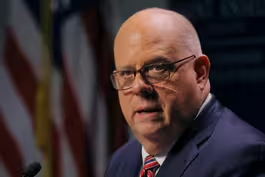
How college admissions practices benefit richest applicants
Clip: 7/24/2023 | 6m 39sVideo has Closed Captions
Study outlines how college admissions practices benefit richest applicants
A study shows how college admissions practices benefit the richest applicants. Opportunity Insights, a group of Harvard economists, analyzed data from 12 of the country’s top colleges from 1999 to 2015. They found that among students with the same test scores, applicants with families in the top one percent were 34 percent more likely to be accepted. Geoff Bennett discussed more with Raj Chetty.
Problems playing video? | Closed Captioning Feedback
Problems playing video? | Closed Captioning Feedback
Major corporate funding for the PBS News Hour is provided by BDO, BNSF, Consumer Cellular, American Cruise Lines, and Raymond James. Funding for the PBS NewsHour Weekend is provided by...

How college admissions practices benefit richest applicants
Clip: 7/24/2023 | 6m 39sVideo has Closed Captions
A study shows how college admissions practices benefit the richest applicants. Opportunity Insights, a group of Harvard economists, analyzed data from 12 of the country’s top colleges from 1999 to 2015. They found that among students with the same test scores, applicants with families in the top one percent were 34 percent more likely to be accepted. Geoff Bennett discussed more with Raj Chetty.
Problems playing video? | Closed Captioning Feedback
How to Watch PBS News Hour
PBS News Hour is available to stream on pbs.org and the free PBS App, available on iPhone, Apple TV, Android TV, Android smartphones, Amazon Fire TV, Amazon Fire Tablet, Roku, Samsung Smart TV, and Vizio.
Providing Support for PBS.org
Learn Moreabout PBS online sponsorshipGEOFF BENNETT: A new study out today shows how college admissions practices benefit the richest applicants.
Opportunity Insights, a group of Harvard economists, analyzed data from 12 of the country's top colleges from 1999 to 2015.
They found that among students with the same test scores, applicants with families in the top 1 percent of earners were 34 percent more likely to be accepted.
Those from the top point 0.1 percent were twice as likely to be accepted.
And schools gave preference to legacies and student athletes, among others.
Overall, one in six students at Ivy League schools had parents in the highest income bracket.
Raj Chetty directs Opportunity Insights and co-authored the study.
And he joins us now.
So, Raj, based on your research, how are elite institutions giving an admissions advantage to students who come from wealthy families?
RAJ CHETTY, Director, Opportunity Insights: Great to be here, Geoff.
So, what we're finding in this study looking at detailed admissions data for many Ivy League and other highly selective colleges, is that there are three key factors that lead to higher admissions rates for kids from the very highest-income families in America, families making more than about $600,000 a year.
The first is legacy admissions.
If your parents went to a given college, you have a five- or six-fold higher chance of getting into that college, relative to somebody else with the exact same application credentials.
Second, recruited athletes are of -- have a significant advantage in getting into these colleges.
And they tend to come primarily from very high-income families.
And, third, we find that non academic credentials -- think of things like extracurriculars or other activities, leadership traits outside the classroom -- these credentials tend to be much stronger among kids from very high-income families and, in particular, much stronger among kids who went to elite private high schools, which, of course, tend to be attended primarily by kids from very high-income families.
Together, those three things explain why kids from the highest-income families are about two times as likely to get in as kids from middle-class families.
GEOFF BENNETT: There are certainly people who will hear this and think that being wealthy affords all sorts of advantages in life.
It stands to reason that would extend to college admissions.
Why, in your view, should this research give people pause?
RAJ CHETTY: I think what's surprising to us about this study is not simply that there are more high-income kids than middle-class kids at these colleges.
As you noted, we might expect that, given that there's an accumulation of advantages that kids from high-income families have, going to better schools, growing up in better neighborhoods, so forth and so on, over many, many years.
What I think critical that we're finding in this study is, that's not enough to explain why you have one in six kids coming from the top 1 percent at our nation's top colleges, even relative to all those benefits.
If you look at their SAT scores at the point that they're applying to college, something like 7 percent of kids with the highest SAT scores are coming from families in the top 1 percent.
But 16 percent of kids attending our nation's top private colleges are coming from families in the top 1 percent.
So what that's telling us is, even above and beyond the advantages they have had throughout childhood, the kids from high-income families are getting an additional boost in the admissions process at the best colleges.
GEOFF BENNETT: Our team reached out to some of the elite universities mentioned in your -- in your study.
And a spokesperson from Princeton University says that this data is from 2015 and that the share of low-income students has changed since then.
Here's part of that statement: "The percentage of Pell-eligible students at Princeton has more than doubled since the first of the cohort Chetty analyzed was admitted more than a decade ago.
Lower-income students now make up more than a fifth of the student body at Princeton."
What do you make of that?
And is it a mistake to look at this data from eight years ago, as if it captures the current moment?
RAJ CHETTY: So that's a great point.
And we look at how these things are changing over time as well.
And Princeton, in particular, has been a leader in admitting and recruiting more kids from lower-income families.
But what we're finding, in particular, in this study is that it's sort of the middle class that's being squeezed, that's missing from these colleges.
And, in particular, if you look at admissions rates, they're the lowest from kids in what you might think of as upper-middle-income families, going to what you think of as good public schools living in good neighborhoods.Those kids have the lowest chances of getting in, lower than those kids at the bottom end of the income distribution, and especially much lower than the kids from the very, very top of the income distribution, many of whom are going to private schools and so on.
And so that piece of it, I think, still persists today, to the present point, and I think it's extremely important to think about at Princeton and many other colleges around the U.S. GEOFF BENNETT: So, if it's the kids from affluent families that are getting the advantages, and kids from the lower-income families in some cases that are getting the attention from the schools that are focused on diversity, how should these universities make sure that their student bodies reflect economic diversity and include more middle-class families, as you mentioned?
RAJ CHETTY: I think it comes back to thinking about the three factors we identified as driving the very high-income admissions advantage.
Does it make sense to have legacy preferences?
Does it make sense to be recruiting athletes in particular from the highest-income families?
And does it make sense to be focused on non-academic credentials?
Now, one point I would stress in that context is, when we follow these kids over time and look at their outcomes after college, you can ask, is it the case that kids with the stronger credentials, extracurriculars and so on -- maybe they're more qualified candidates.
Maybe they're doing better 10 years after college, and it's sort of merited that they're admitted at higher rates.
But, actually, we find, when we look at a wide variety of outcomes, your incomes, your chances of working at a prestigious firm going to a top graduate school, there actually is no evidence that the kids who are getting those admissions advantages are doing any better.
And so one simple answer to your question is revisiting whether those three advantages really make sense.
Possibly pulling back on them could allow more middle-class kids a shot at these opportunities.
Another possibility is to take a need-affirmative approach and recognize that kids coming from less well-resourced schools, maybe they deserve a boost up in the admissions process as well.
GEOFF BENNETT: Raj Chetty is professor of economics at Harvard University.
Thanks for being with us.
RAJ CHETTY: Thank you, Geoff.
My pleasure.
Impact of Israeli plan to overhaul judicial system
Video has Closed Captions
Clip: 7/24/2023 | 10m 59s | The impact of Israeli government's controversial plan to overhaul judicial system (10m 59s)
Larry Hogan on possible third-party presidential ticket
Video has Closed Captions
Clip: 7/24/2023 | 7m 40s | Larry Hogan of No Labels discusses possible third-party presidential ticket (7m 40s)
Most young Americans support stricter gun laws, survey shows
Video has Closed Captions
Clip: 7/24/2023 | 6m 53s | Most young Americans feel unsafe and support stricter gun laws, new survey shows (6m 53s)
Success of 'Barbie' film adds to doll's cultural legacy
Video has Closed Captions
Clip: 7/24/2023 | 8m 55s | Success of 'Barbie' film adds to doll's cultural legacy (8m 55s)
UPS, workers resume negotiations before strike deadline
Video has Closed Captions
Clip: 7/24/2023 | 7m 45s | UPS and unionized workers resume negotiations a week before strike deadline (7m 45s)
Providing Support for PBS.org
Learn Moreabout PBS online sponsorship
- News and Public Affairs

FRONTLINE is investigative journalism that questions, explains and changes our world.

- News and Public Affairs

Amanpour and Company features conversations with leaders and decision makers.












Support for PBS provided by:
Major corporate funding for the PBS News Hour is provided by BDO, BNSF, Consumer Cellular, American Cruise Lines, and Raymond James. Funding for the PBS NewsHour Weekend is provided by...




